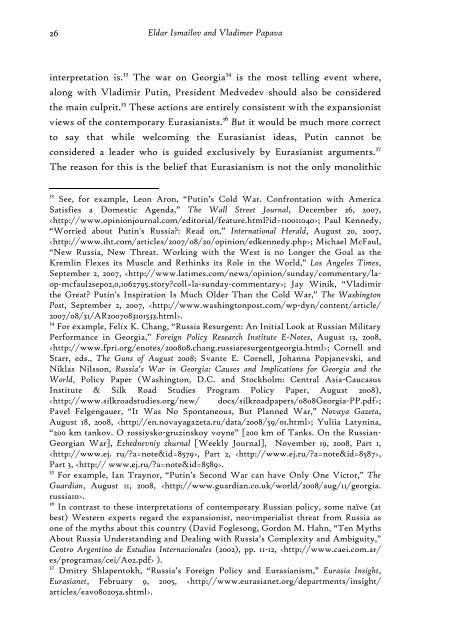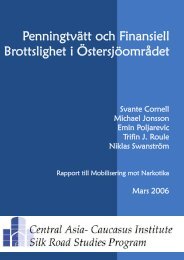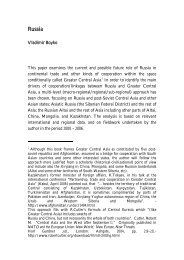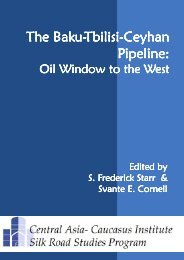Eurasianism and the Concept of Central Caucaso-Asia
Eurasianism and the Concept of Central Caucaso-Asia
Eurasianism and the Concept of Central Caucaso-Asia
You also want an ePaper? Increase the reach of your titles
YUMPU automatically turns print PDFs into web optimized ePapers that Google loves.
26<br />
Eldar Ismailov <strong>and</strong> Vladimer Papava<br />
interpretation is. 33 The war on Georgia 34 is <strong>the</strong> most telling event where,<br />
along with Vladimir Putin, President Medvedev should also be considered<br />
<strong>the</strong> main culprit. 35 These actions are entirely consistent with <strong>the</strong> expansionist<br />
views <strong>of</strong> <strong>the</strong> contemporary Eurasianists. 36 But it would be much more correct<br />
to say that while welcoming <strong>the</strong> Eurasianist ideas, Putin cannot be<br />
considered a leader who is guided exclusively by Eurasianist arguments. 37<br />
The reason for this is <strong>the</strong> belief that <strong>Eurasianism</strong> is not <strong>the</strong> only monolithic<br />
33 See, for example, Leon Aron, “Putin’s Cold War. Confrontation with America<br />
Satisfies a Domestic Agenda,” The Wall Street Journal, December 26, 2007,<br />
; Paul Kennedy,<br />
“Worried about Putin's Russia?: Read on,” International Herald, August 20, 2007,<br />
; Michael McFaul,<br />
“New Russia, New Threat. Working with <strong>the</strong> West is no Longer <strong>the</strong> Goal as <strong>the</strong><br />
Kremlin Flexes its Muscle <strong>and</strong> Rethinks its Role in <strong>the</strong> World,” Los Angeles Times,<br />
September 2, 2007, ;<br />
Jay Winik, “Vladimir<br />
<strong>the</strong> Great? Putin's Inspiration Is Much Older Than <strong>the</strong> Cold War,” The Washington<br />
Post, September 2, 2007, .<br />
34 For example, Felix K. Chang, “Russia Resurgent: An Initial Look at Russian Military<br />
Performance in Georgia,” Foreign Policy Research Institute E-Notes, August 13, 2008,<br />
; Cornell <strong>and</strong><br />
Starr, eds., The Guns <strong>of</strong> August 2008; Svante E. Cornell, Johanna Popjanevski, <strong>and</strong><br />
Niklas Nilsson, Russia’s War in Georgia: Causes <strong>and</strong> Implications for Georgia <strong>and</strong> <strong>the</strong><br />
World, Policy Paper (Washington, D.C. <strong>and</strong> Stockholm: <strong>Central</strong> <strong>Asia</strong>-Caucasus<br />
Institute & Silk Road Studies Program Policy Paper, August 2008),<br />
;<br />
Pavel Felgengauer, “It Was No Spontaneous, But Planned War,” Novaya Gazeta,<br />
August 18, 2008, ; Yuliia Latynina,<br />
“200 km tankov. O rossiysko-gruzinskoy voyne” [200 km <strong>of</strong> Tanks. On <strong>the</strong> Russian-<br />
Georgian War], Ezhednevniy zhurnal [Weekly Journal], November 19, 2008, Part 1,<br />
, Part 2, ,<br />
Part 3, .<br />
35 For example, Ian Traynor, “Putin's Second War can have Only One Victor,” The<br />
Guardian, August 11, 2008, .<br />
36 In contrast to <strong>the</strong>se interpretations <strong>of</strong> contemporary Russian policy, some naïve (at<br />
best) Western experts regard <strong>the</strong> expansionist, neo-imperialist threat from Russia as<br />
one <strong>of</strong> <strong>the</strong> myths about this country (David Foglesong, Gordon M. Hahn, “Ten Myths<br />
About Russia Underst<strong>and</strong>ing <strong>and</strong> Dealing with Russia’s Complexity <strong>and</strong> Ambiguity,”<br />
Centro Argentino de Estudios Internacionales (2002), pp. 11-12, ).<br />
37 Dmitry Shlapentokh, “Russia’s Foreign Policy <strong>and</strong> <strong>Eurasianism</strong>,” Eurasia Insight,<br />
Eurasianet, February 9, 2005, .






